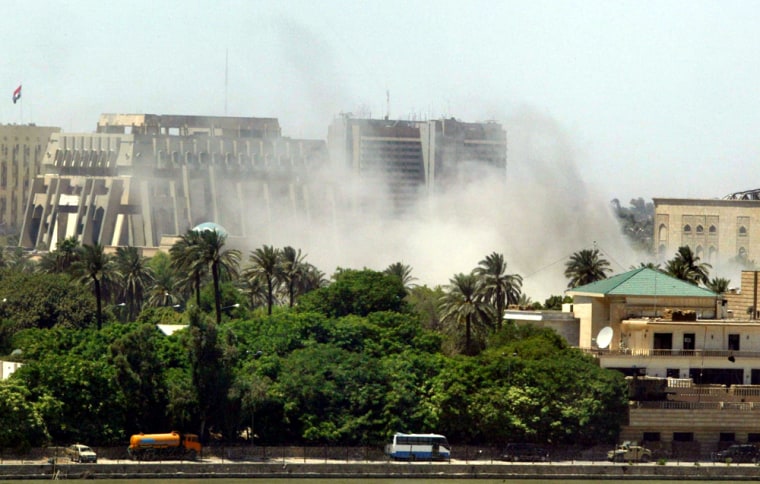Despite the steady clang of mortar shells outside and persistent violence in the country, many delegates at the opening on Sunday of Iraq’s National Conference held out hope that this first fragile taste of democracy would succeed.
“So far, so good,” said delegate Saad Qindeel, from the Supreme Council for the Islamic Revolution in Iraq, the country’s largest religious group. “It’s important that this conference succeeds, and it has many obstacles before it.”
The three-day conference is an unprecedented forum for Iraqis of all ethnic and religious groups to discuss their visions for the future of this country, which is struggling with a Sunni insurgency, a renewed uprising by Shiite militants and constant sabotage attacks on its reconstruction efforts.
The gathering was held under intense security precautions in the fortified Green Zone enclave in Baghdad, with helicopters flying overhead and 15-foot-high concrete barriers blocking the entrance. Bridges leading to the area were barricaded and the government imposed a daytime curfew for the area. The delegates were all frisked for weapons.
Despite the precautions, explosions shook the conference hall. A mortar barrage rammed a commuter bus station nearby, killing two people and wounding 17 others, the Health Ministry said.
Inside the Green Zone, the 1,300 religious, political and civic leaders were tasked with helping elect a 100-member national council to act as a watchdog over the interim government ahead of elections scheduled for January.
That, U.N. and U.S. officials hope, will bring more of Iraq’s many factions behind the government of Prime Minister Ayad Allawi — strengthening it in the eyes of many skeptical Iraqis.
“This conference is not the end of the road for us, it is the first step ... to open up horizons of dialogue,” Allawi said in his opening speech. “Your blessed gathering here is a challenge to the forces of evil and tyranny that want to destroy this country.”
One major conflict that threatened to overshadow the conference was the resurgence of violence Sunday in the holy city of Najaf, where dissident Shiite cleric Muqtada al-Sadr and his followers have battled U.S. and Iraqi troops since Aug. 5.
Nadim al-Jadari, of the Shiite Political Council, sprang onto the stage after the opening speeches and threatened to withdraw unless negotiations to end the Najaf fighting resumed.
“The Iraqi government bears the responsibility for what is going on in Najaf. It has brought U.S. forces to hit our people in Najaf,” said Falah Hassan, another group official. “Our demand is to halt the military operations in Najaf and other parts of Iraq. We will withdraw from the conference within 24 hours if our demands are not met.”
But other delegates dismissed the notion of abandoning the conference.
“I think it’s irresponsible to boycott.” Qindeel said. “If we disagree about something, the right thing to do is to work on it, not walk out.”
A walkout by even a small fraction of the delegates would be a symbolic blow to the government as it tries to project a carefully crafted message of inclusion to Iraqis of different ethnic and religious groups.
Organizers worked quickly to assuage complaints by forming a new working committee to find a peaceful solution in Najaf. Other committees formed Sunday were to produce papers on economics and human rights.
During the conference, delegates hunched over styrofoam containers of kebabs and salad, drinking tea and talking. Clerics in black robes and turbans swished past men in sharp suits.
Women both scarved and suited chattered into mobile phones. A condition for the gathering was that women make up at least 25 percent of those attending. The national council must also be 25 percent female.
In January, Iraq is to hold elections to choose a transitional government. The newly elected government then will convene a national convention to draft a constitution to be put to the voters in October 2005. Iraqis will then hold another vote in December 2005 for a constitutionally based government.
SCIRI’s Qindeel said the conference needed to send a strong message that political dialogue, not violence, was the only way Iraq could overcome its problems.
“The logic of bullets, of force, of military operations, has no place in our society to settle political differences,” he said. “I sincerely hope this will change. It’s been a long time coming.”
